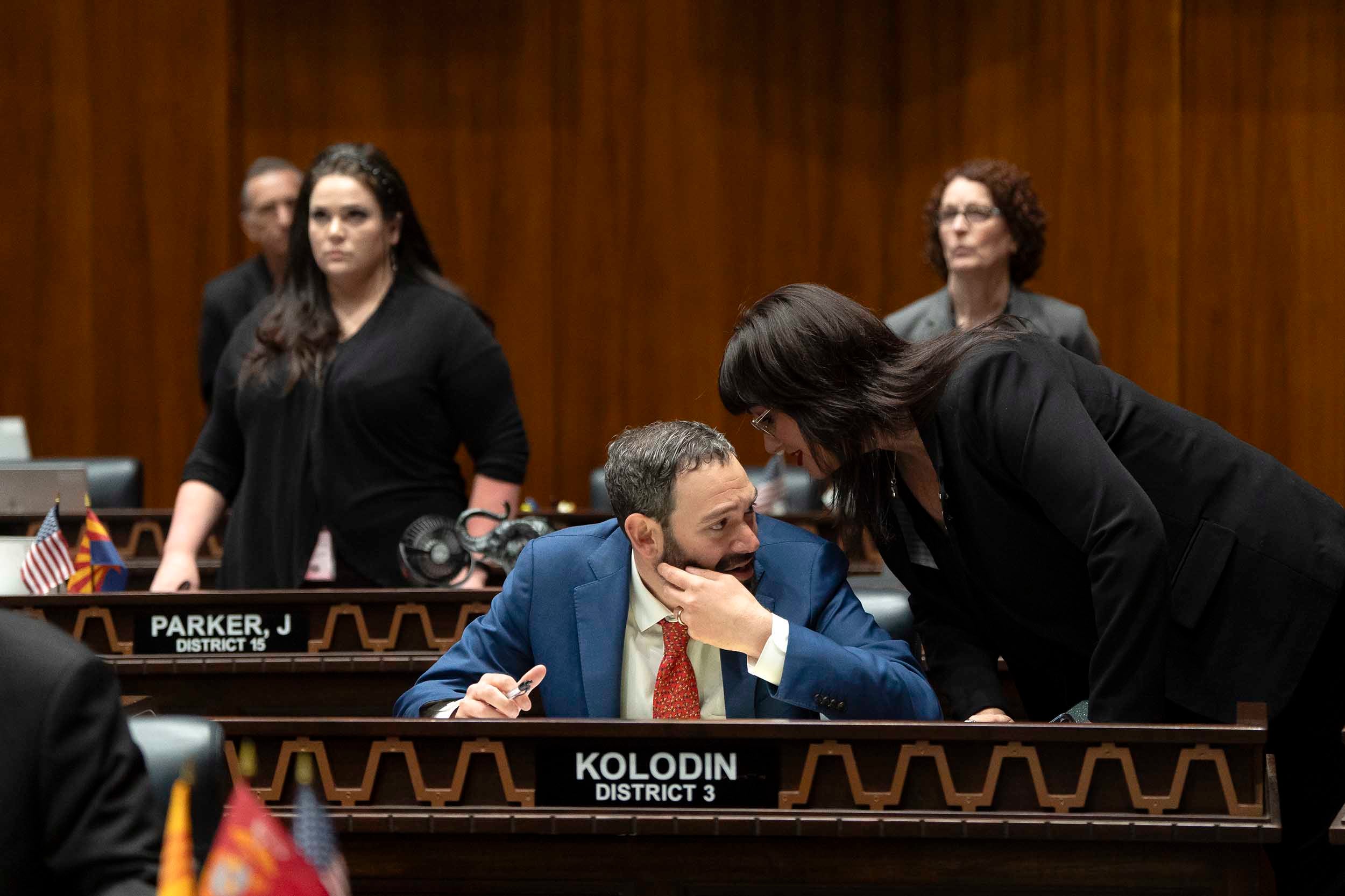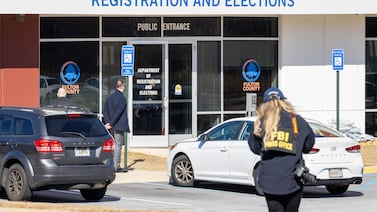Votebeat is a nonprofit news organization reporting on voting access and election administration across the U.S. Sign up for Votebeat Arizona’s free newsletter here.
The release of new draft rules dictating how Arizona’s elections must be run has reopened partisan battles over such issues as how officials handle voter citizenship checks, conduct early voting, and count ballots.
Republican lawmakers are threatening to again sue Secretary of State Adrian Fontes, a Democrat, if he doesn’t change these rules and others he included in his draft of Arizona’s Elections Procedures Manual, the document that explains how officials must implement state law.
House Speaker Steve Montenegro wrote in a news release that the draft manual weakens safeguards against noncitizen voting and undermines legislative authority. “Such abuses erode trust in our elections and will not stand,” he wrote.
It’s been years since new election rules have been fully implemented, because of political disagreements and court battles, and comments from Montenegro and other legislative leaders indicate the court fights won’t end soon. Under state law, the secretary of state must update the manual every two years. But in 2021, state lawmakers did not come to the required consensus on new rules, and in 2023, court battles put the entire manual up in the air.
While Fontes’ latest draft removed some of the contested language that was in his last manual, Republicans are now arguing against other provisions — most of which were also in the 2023 manual.
In response to the new Republican complaints, Fontes spokesman Aaron Thacker said the Secretary of State’s office will consider all comments as Fontes finalizes the rulebook to send to the governor and state attorney general for final approval by the end of the year.
“As for the statements about legal action, we believe it’s premature to speculate on the final content of the EPM,” Thacker said. “The process is still very much underway. Let’s allow that process to unfold before jumping to conclusions or engaging in political theater.”
Rules on confirming voter citizenship
One Republican complaint involves what Fontes’ draft says should happen when an election official finds information in databases showing that someone who is attempting to register to vote is not a U.S. citizen, and is therefore ineligible. Montenegro and Senate President Warren Petersen raised that issue in a letter to Fontes.
The lawmakers say that in such cases, under state law, the voter’s application must be rejected. But Fontes wrote in his manual that, when the applicant uses a federal form to apply, the voter’s application should rather be placed on hold. If the voter can prove their citizenship by 7 p.m. on Election Day, they would be permitted to vote, he wrote.
The disagreement may have something to do with the ongoing court battle over that state law. A federal judge last year blocked some provisions of it, and that ruling is now on appeal. But it’s unclear if this particular provision on confirming citizenship is among those blocked.
GOP legislative leaders also say Fontes’ draft gives officials incorrect instructions on what to do if a new voter registration is submitted on a state application form without proof of citizenship. They say state law requires officials to reject the application, but Fontes’ draft directs the officials to try to find documents proving citizenship in the state’s motor vehicle database on the voter’s behalf before rejecting the application.
State Rep. Alex Kolodin, who also sent a letter to Fontes listing provisions that he thought violated state law, included rules on confirming voter citizenship on that list.
Montenegro and Petersen also say that Fontes has incorrectly written that early ballots cannot be challenged on the grounds that the voter didn’t provide proof of citizenship.
These voter citizenship rules that the lawmakers are questioning were all in the 2023 manual, but were not included in Republican lawsuits challenging that manual.
Restrictions on voter intimidation
Kolodin, who is running against Fontes for secretary of state in 2026, also said he believes Fontes didn’t do enough to correct a section on what constitutes voter intimidation. A federal judge blocked Fontes’ 2023 rules on that, but Fontes appealed that decision to the 9th U.S. Circuit Court of Appeals. The court recently held a hearing on the case, and the matter is pending.
The 2023 manual prohibited actions that might be threatening, harassing, or intimidating, both inside and outside the 75-foot radius around a polling site where electioneering is prohibited.
The new manual cites federal and state laws that prohibit voter intimidation, but is less broad. And while the 2023 manual gave an example of using “threatening, insulting or offensive language to a voter or poll worker,” the new manual deletes the words “insulting” and “offensive.”
But in a footnote, Fontes gave more examples, such as “intentionally following individuals delivering ballots to the drop box when such individuals are not within 75 feet of a drop box,” and “speaking to or yelling at an individual, without provocation, who that person knows is returning ballots to the drop box and who is within 75 feet of the drop box.”
Kolodin says that this section still includes vague language that could chill free speech at polling places and drop boxes. It lists actions such as speaking to voters or monitoring ballot deliveries as potential violations.
Asked last month about his revisions to that section, Fontes said that his office was “trying to walk the line between some of the crazy rulings that we’ve seen coming out of the court that seem to protect the First Amendment rights of people who would scream at voters in line, and those First Amendment rights of voters to peaceably assemble.”
Rules on early in-person voting and ballot counting
Kolodin’s letter also points to two other areas where he believes Fontes’ instructions incorrectly interpret provisions of state law — provisions that haven’t yet been tested in court.
The first issue is a line in the manual that says officials “shall establish in-person early voting locations throughout the county as practicable to ensure that all voters may reasonably access at least one early voting location.”
While the word “shall” in that sentence makes it mandatory for recorders, state law phrases it differently: It says that officials “may establish on-site early voting locations at the office of the county recorder or at other locations in the county deemed necessary or appropriate by the recorder.”
The second issue is whether counties must use tabulation machines for the initial counting of ballots. Some election lawyers in the state consider the state law on this unclear.
Fontes has taken the position that the law requires counties to use the machines, and that they cannot hand-count ballots at all unless it’s during the post-election hand-count audit required by statute.
In a footnote, he points to a few lines in state law on this, such as one that states that ballots can be hand-counted only if it “becomes impracticable to count all or a part of the ballots with tabulating equipment.”
Kolodin, though, points to another line in state law that uses the “may” phrasing rather than “shall”: It states that ballots “may be cast, recorded and counted by voting or marking devices and vote tabulating devices.”
Jen Fifield is a reporter for Votebeat based in Arizona. Contact Jen at jfifield@votebeat.org.






